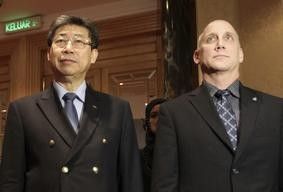Football Officials Meet in Malaysia to Tackle Match-Fixing

Two hundred officials from 43 countries have gathered in Malaysia to find ways to tackle the "pandemic" of match-fixing in football.
Earlier this month, Europol, the European anti-crime agency, found that around 680 football matches had been fixed, including World Cup and European Championship qualifiers. Of these matches, 380 took place in Europe, while the other 300 were played in Asia.
The anti-crime agency also said that match-fixing was networked out of Singapore, and documented profits amounted to €7m (£6.1m; $9.3m).
Though Europol did not reveal the identity of the 'fixed' matches, they said some 425 officials and players had been involved in the illicit operation.
Europol also suggested that a Champions League fixture on English soil 'three or four years ago' was fixed.
Speaking ahead of the AFC-Interpol two-day seminar, entitlted 'Match Fixing: The Ugly Side of the Beautiful Game', AFC acting president Zhang Jilong said that match-fixing was "pandemic" and was "too complicated and widespread for one organisation to fight it alone."
Zhang called for a joint effort of all football federations to eradicate match-fixing, saying: "It is well known that Asia has zero tolerance for match-fixing. We have been working together with FIFA and our Member Associations to tackle this serious problem for some time now."
He added that, although Asia has become the epicentre for match-fixing, the problem spreads across all continents and none is free from corruption.
FIFA's director of security, Ralf Mutschke, said the vast number of games played and the massive increase in online betting make the sport an easy target for organised crime.
"Where money flows, corruption often follows. We need and must target our action at a global level. FIFA cannot fight and win this battle against corruption in football alone; involving all parties that need to work together is the key to the battle against corruption in football," said Mutschke.
In a recent poll conducted by FourFourTwo, 14 percent of respondents, comprising around 100 professional football players in England and Spain, admitted that match-fixing was rife in the game. An unnamed League Two defender said:
"It goes on, I'm telling you. I've had players calling me and tell me to bet on the outcome of the match, especially at the end of the season. I've never been approached myself, but I know it goes on."
On 19 February, the Chinese FA banned 33 players and officials for life, including fining Shanghai Shenhua £103,000 and stripping them of their 2003 league title.
In their three-year enquiry, the Chinese FA found that the club, which attracted talents like Didier Drogba and Nicolas Anelka in 2012, had offered bribes to match officials in their 4-1 victory over Shanxi Guoli.
Thai FA has also started investigating last November's FA Cup final played between Buriram United and Army United, a match in which the former won 2-1. The referee alleged that one of the teams offered him a bribe to favour them.
Match-fixing has plagued Asian football with South Korea and Malaysia handing out life bans to players, officials and referees involved in it.
In 2006, Italy was rocked by the Calciopoli scandal, involving top Serie A and B teams. In 2006 Italian police implicated Juventus and other major teams including AC Milan, Fiorentina and Lazio, when they uncovered telephone conversations between clubs and referees.
© Copyright IBTimes 2025. All rights reserved.





















